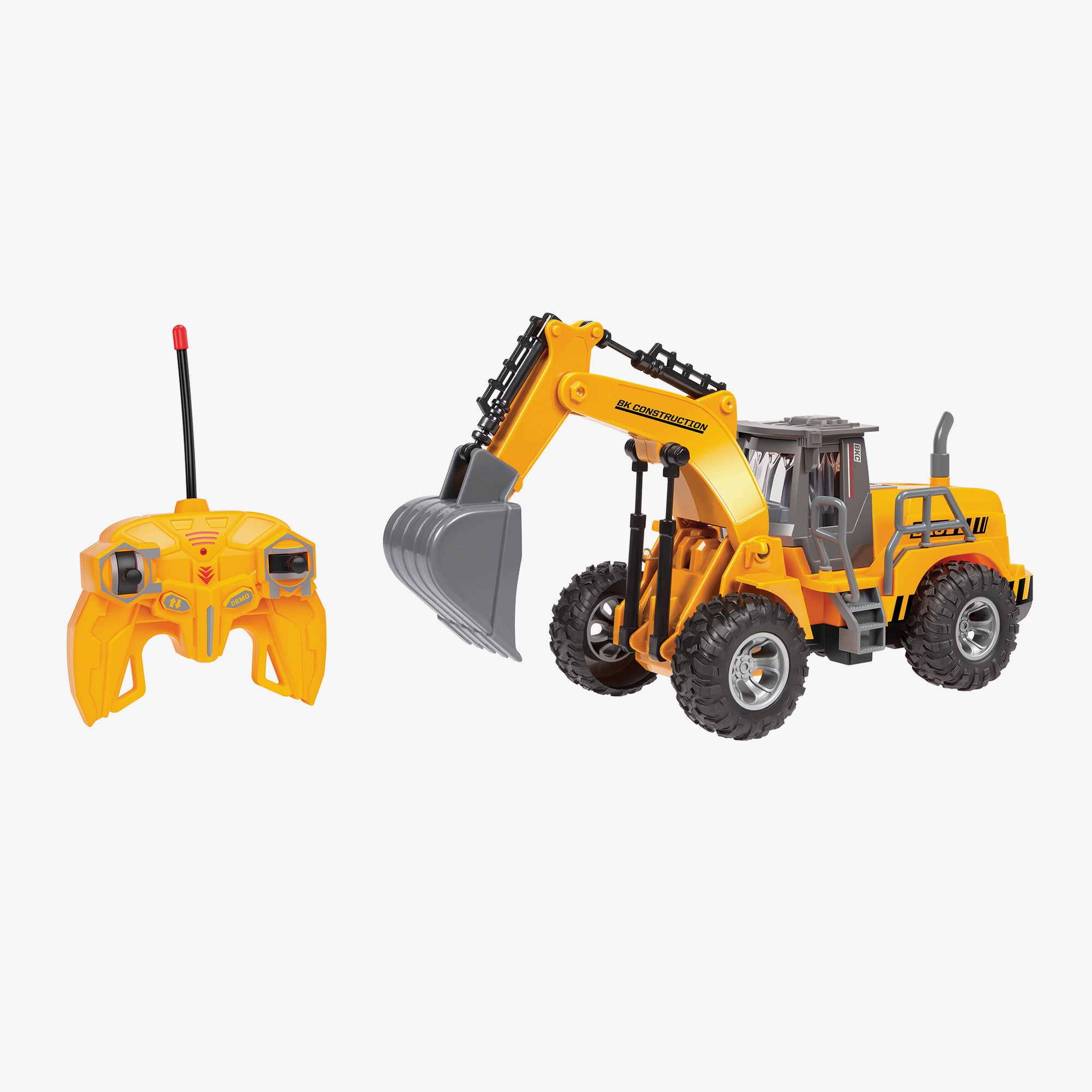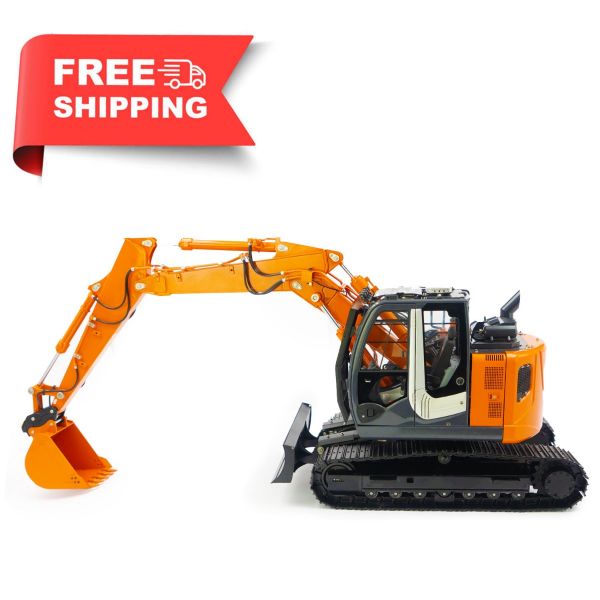The Top Benefits of Using a remote control excavator in Demolition Tasks
Understanding Just How Excavator Works and Its Influence On Efficiency
Excavators play an important role in construction and mining operations, counting on an intricate interaction of hydraulic and mechanical systems. Their ability to perform a selection of jobs depends upon both their style and the innovation integrated within. Comprehending these elements can significantly influence functional effectiveness and performance. As innovations remain to improve the sector, one must take into consideration how these adjustments will certainly affect future techniques and efficiency.
The Basics of Excavator Mechanics

The Function of Hydraulic Systems in Excavators
At the heart of excavator procedure exists the hydraulic system, which plays an essential role in powering the machine's activities and functions. This system makes use of pressurized hydraulic fluid to move energy, enabling numerous actions such as lifting, excavating, and swinging. By harnessing the principles of hydraulics, excavators can execute tasks with exceptional precision and pressure, improving total operational efficiency.The hydraulic system includes key components, including cyndrical tubes, shutoffs, and pumps, which collaborate to manage the flow and instructions of the fluid. When the driver involves the controls, the hydraulic liquid is guided to details cyndrical tubes, converting the operator's commands right into physical activity. This device enables smooth and responsive actions, which are essential in building and excavation settings. double e volvo rc excavator. The efficiency of the hydraulic system directly influences the efficiency and convenience of the excavator, making it an important component in modern-day excavation processes
Trick Components of an Excavator
Recognizing the essential elements of an excavator is important for comprehending exactly how this powerful device runs. An excavator includes numerous considerable components, consisting of the undercarriage, house, arm, boom, and bucket. The undercarriage provides stability and movement, frequently featuring wheels or tracks to navigate numerous surfaces. Your home includes the engine and hydraulic systems, permitting the driver to regulate motion and power the device. The boom expands from your home, allowing upright reach, while the arm connects to the container, assisting in excavating and lifting operations.Additionally, the taxicab houses the driver, geared up with controls for specific maneuvering. Each of these parts plays an important duty in the excavator's total capability, contributing to its effectiveness and efficiency on construction sites. Comprehending these components helps in preserving and maximizing excavator efficiency, ensuring jobs are completed securely and properly.
Accessory Adaptability and Its Advantages
Add-on convenience is a vital element of excavators, enabling operators to switch over between different tools tailored for particular tasks. This versatility not just enhances job efficiency yet also adds to cost-effectiveness by decreasing the requirement for multiple machines. Recognizing the different sorts of add-ons available can significantly influence the general efficiency and performance of an excavator on task websites.
Kinds of Attachments
While excavators are mainly recognized for their excavating capacities, their real convenience hinges on the vast variety of add-ons available. These add-ons improve the excavator's functionality, allowing it to do various tasks past excavation. Usual add-ons consist of buckets (for digging and scooping), hydraulic thumbs (for understanding products), and augers (for piercing openings) Grapples are used for managing and relocating particles, while rippers can damage up hard surface areas. Other specialized add-ons, such as trenchers and plows, enable excavators to adjust to particular task demands. This variety not only boosts the equipment's energy throughout different sectors, consisting of construction, landscape design, and demolition, but likewise allows drivers to customize their equipment to satisfy certain job demands successfully.
Increased Job Efficiency
Optimizing work effectiveness is a primary benefit of using various excavator add-ons. Different accessories permit an excavator to perform numerous jobs without needing to switch over tools, saving valuable time and labor. Utilizing a hydraulic hammer can damage concrete while a bucket add-on can dig deep into dirt, enabling a smooth workflow. This convenience reduces downtime connected with equipment adjustments and boosts productivity on-site. Furthermore, specialized attachments enhance accuracy in tasks such as grading or landscape design, resulting in better outcomes. The capacity to adapt to various task demands not just enhances operations yet also reduces the requirement for additional machinery, making sure that tasks are finished promptly and efficiently. Overall, add-on flexibility substantially adds to boosted job efficiency in excavation work.
Cost-Effectiveness and Convenience
Cost-effectiveness is a significant benefit of making use of versatile excavator attachments. These accessories enable a single excavator to execute numerous jobs, lowering the demand for extra machinery and labor - double e volvo rc excavator. By switching between buckets, hammers, and grapples, drivers can tackle various tasks, from excavating to demolition, therefore maximizing devices application. This versatility not only decreases operational expenses yet likewise minimizes downtime related to altering devices. Additionally, the ability to personalize excavators with specialized accessories improves performance, as they can efficiently manage diverse tasks according to job you can look here demands. In conclusion, the mix of cost-effectiveness and adaptability in excavator accessories adds to enhanced operational performance and source allocation in construction and excavation jobs

Advanced Innovation in Modern Excavators
Modern excavators are significantly equipped with sophisticated innovation that transforms excavation processes. Automation enhances procedures, while boosted gas performance minimizes operational expenses. Furthermore, wise control systems enhance accuracy and safety, marking a significant development in excavation devices.
Automation in Excavation Processes
As excavation innovation develops, automation has actually become a crucial part in improving efficiency and precision on task sites. Modern excavators are equipped with innovative automated systems that assist in tasks such as grading, digging, and trenching with very little operator treatment. These systems utilize sensors, GPS, and artificial intelligence algorithms to ensure exact positioning and deepness control, significantly decreasing the margin for error. In addition, automation enables operators to concentrate on tactical decision-making instead of manual controls, bring about improved performance overall. Such innovations not only simplify process however also boost safety by reducing human error in complex procedures. Subsequently, the combination of automation in excavation processes represents a significant development in building and construction technology, driving the sector towards greater effectiveness and efficiency.
Boosted Fuel Effectiveness
Innovations in modern technology have actually additionally led to substantial renovations in fuel efficiency for contemporary excavators. Modern makers are outfitted with advanced engines that maximize power result while lowering fuel consumption. These engines make use of ingenious combustion modern technologies, such as turbocharging and straight fuel shot, to improve efficiency and performance. Furthermore, lightweight materials in building and construction lower total weight, allowing for less power discover this expense during operation. The intro of variable rate controls enables operators to change engine efficiency according to particular tasks, even more lessening gas use. As an outcome, these enhancements not just lower functional expenses but also add to environmental sustainability by lowering discharges. In general, enhanced gas performance in excavators is an essential development that strengthens efficiency and economic feasibility in the construction industry.
Smart Control Solution
While drivers browse significantly complex work sites, clever control systems in excavators have actually arised as vital devices for improving efficiency and accuracy. These innovative technologies utilize sensing units and formulas to check various parameters such as load weight, terrain problems, and functional performance. By automatically readjusting hydraulic functions, wise systems maximize maker performance, causing enhanced productivity and minimized wear on elements. Additionally, operators gain from user-friendly user interfaces that give real-time responses and diagnostics, enabling educated decision-making. This assimilation of innovation not only enhances operations however additionally minimizes human error, adding to much safer job environments. As the building market remains to progress, clever control systems will certainly play a crucial function in shaping the future of excavator effectiveness and performance.
Enhancing Functional Performance With Excavators
Excavators play a crucial duty in boosting operational effectiveness throughout various building and excavation projects. Their versatility enables for numerous tasks, including product, excavating, and training handling, which simplifies workflows and reduces the demand for extra equipment. With effective hydraulic systems, excavators can do sturdy jobs with accuracy, substantially decreasing the moment called for to total tasks. The integration of sophisticated innovation, such as general practitioner and automated controls, even more maximizes their procedure, allowing drivers to achieve greater accuracy and lower material waste. In addition, contemporary excavators are designed to consume much less gas and minimize discharges, adding to both cost savings and environmental sustainability. By using excavators properly, building and construction groups can improve productivity, meet job target dates, and improve total website monitoring. This multifunctionality and performance make excavators vital tools in the modern-day building landscape.
The Future of Excavators in Building and Mining Industries
As the construction and mining markets progress, the future of excavators is positioned for significant improvement driven by technological development and transforming operational needs. Advances in automation and expert system are reshaping excavator capacities, enabling improved precision and performance in procedures. Autonomous excavators are emerging, decreasing the requirement for human intervention and lessening the risk of accidents.Moreover, the assimilation of telematics and IoT modern technology makes it possible for real-time tracking of machine efficiency and anticipating upkeep, maximizing uptime. Green styles, consisting of electrical and hybrid designs, are gaining grip, straightening with sustainability objectives within the industry.Additionally, making use of advanced materials and lighter designs boosts gas efficiency while preserving performance requirements. As these fads progress, excavators will certainly play an important function in fulfilling the raising demands for productivity and security in construction and mining, ultimately changing functional landscapes.
Frequently Asked Questions
Exactly How Do Climate Conditions Influence Excavator Performance?

Climate condition greatly influence excavator performance, as rain and mud can impede grip and stability, while extreme temperatures may affect hydraulic systems. Operators needs to adapt to these variables to ensure perfect performance and security throughout operations.
What Security Procedures Should Operators Comply With While Making Use Of Excavators?
Precaution for excavator operators consist of using ideal personal safety tools, conducting pre-operation assessments, making certain proper interaction with ground workers, preserving a secure distance from overhead dangers, and sticking to well-known functional methods to stop crashes.
Exactly How Often Should Excavators Be Maintained for Optimal Performance?
Excavators should be preserved consistently to assure peak efficiency, generally every 250 operating hours or as specified by the supplier. Routine checks boost dependability, prevent unexpected breakdowns, and extend the lifespan of the equipment.
What Is the Average Life Expectancy of an Excavator?
The ordinary life-span of an excavator normally ranges from 10,000 to 15,000 hours of procedure. Elements influencing long life consist of maintenance techniques, operating problems, and the top quality of the maker itself, impacting total efficiency and effectiveness.

Can Excavators Operate Unequal Terrain Efficiently?
Excavators can run properly on unequal terrain because of their verbalized designs and flexible tracks. These attributes enable them to maintain security and grip, enabling reliable operation in challenging environments this post frequently run into in construction and landscaping jobs. Each of these elements plays a vital function in the excavator's total performance, contributing to its performance and performance on construction sites. Maximizing task performance is a key benefit of using numerous excavator attachments. While operators browse increasingly intricate job websites, smart control systems in excavators have emerged as vital devices for improving effectiveness and accuracy. Excavators play a crucial duty in improving operational effectiveness throughout different building and excavation jobs. Advances in automation and man-made intelligence are improving excavator capacities, permitting for improved precision and performance in operations.